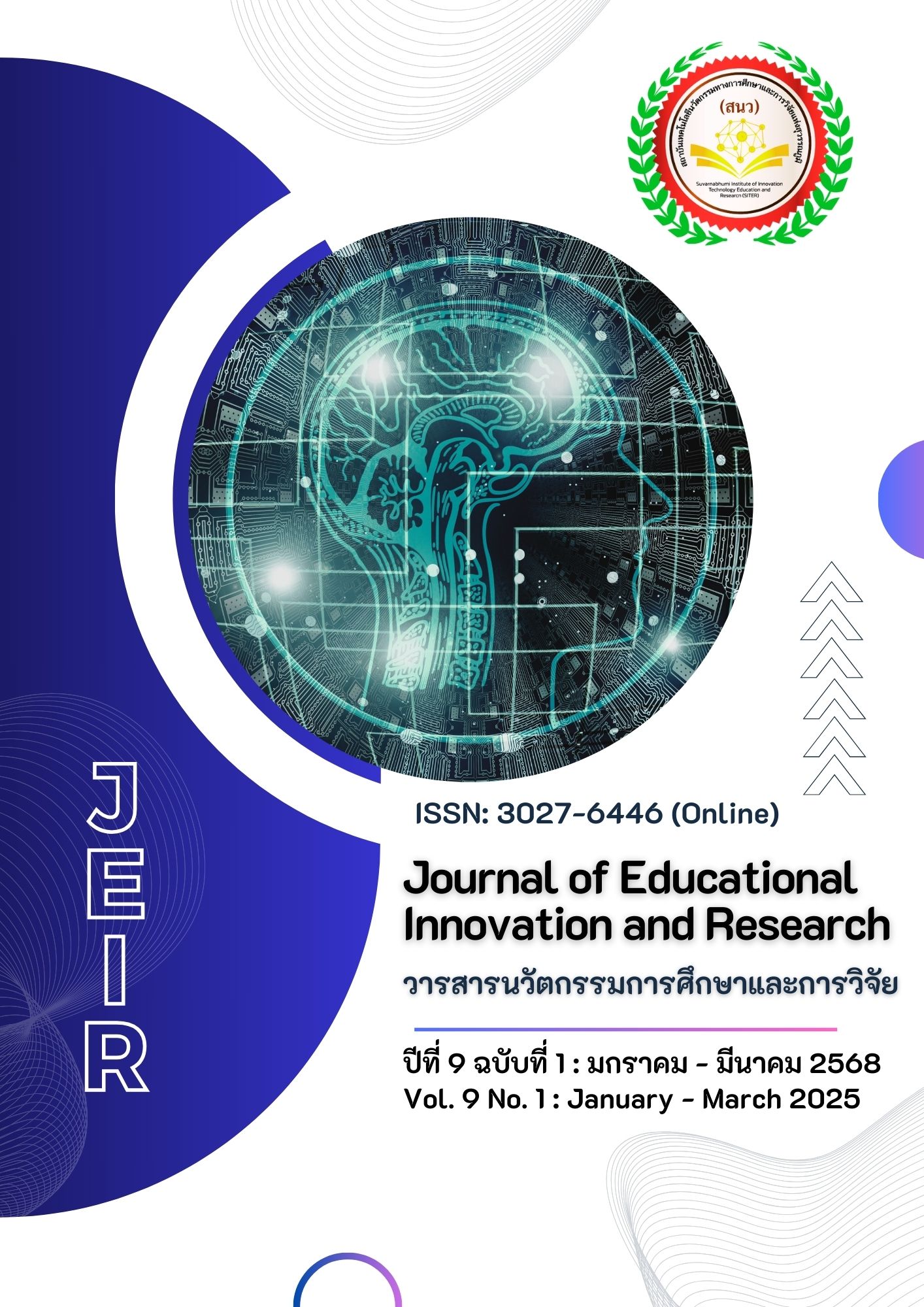The Relationship Between Game-Based Learning and the Promotion of Innovative Thinking Skills in Business Management
Main Article Content
Abstract
This Article aimed to study (1) to develop a game-based learning model to promote innovative thinking skills in business management (2) to compare the innovative thinking skills of learners (3) to investigate the relationship between knowledge scores in innovation design and innovative thinking skills. The samples were 38 fourth-year undergraduate students, selected by a purposive sampling method. The instruments used in this study were an assessment of innovative thinking skills and a test of knowledge in innovation design. Data were analyzed using by descriptive statistics, and nonparametric statistics include the Wilcoxon signed-rank test, and Spearman Rank Correlation.
The research results were found as follows, 1) the developed model consisted of 5 steps were: 1) setting challenging goals, 2) brainstorming, 3) creating work, 4) presenting work, and 5) evaluation, and the evaluation of the game-based learning model's suitability using the CVR method resulted in a value of 1.00, indicating that the model was appropriate. 2) Learners’ innovative thinking skills after using the model was significantly higher than before using the model at the significance level of .05. 3) There was no significant correlation between learners' knowledge of innovation design and innovative thinking skills.
The findings from this research was that gamification environments, activity and assessment by game-based learning can enhance learners' innovative thinking skills, enabling them to create innovations in business management.
Article Details

This work is licensed under a Creative Commons Attribution-NonCommercial-NoDerivatives 4.0 International License.
References
Barr, M. (2019). Graduate skills and game-based learning: Using video games for employability in higher education. Springer Nature.
Cohen, J. (1988). Statistical Power Analysis for the Behavioral Sciences (2nd ed.). Lawrence Erlbaum Associates.
Deterding, S., Dixon, D., Khaled, R., & Nacke, L. (2011). From game design elements to gamefulness: defining" gamification". Proceedings of the 15th International Academic MindTrek Conference: Envisioning Future Media Environments. ACM.
Dyer, J., Gregersen, H., & Christensen, C. M. (2019). The Innovator's DNA, Updated, with a New Preface: Mastering the Five Skills of Disruptive Innovators. Harvard Business Press.
El-Said, M., & Mansour, S. (2008). Game based learning creating a triangle of success: play, interact and learn. International Journal Intelligent Games & Simulation, 5(2), 26-32.
Franco, F. P., & DeLuca, A.D. (2019). Learning through action: creating and implementing a strategy game to foster innovative thinking in higher education. Simulation & Gaming, 50(1), 23-43.
Ichsan, I. Z., Rahmayanti, H., Purwanto, A., Sigit, D. V., Kurniawan, E., Tanjung, A., & Singh, C. K. S. (2021). Thinking level in education: a complete revision of Anderson’s taxonomy. Pedagogika/Pedagogy, 141(1), 53-78.
Hamari, J., Koivisto, J., & Sarsa, H. (2014). Does gamification work? A literature review of empirical studies on gamification. Proceedings of the 47th Hawaii International Conference on System Sciences (HICSS), 3025–3034.
Harika, A., Sunil Kumar, M., Anantha Natarajan, V., & Kallam, S. (2021). Business process reengineering: Issues and challenges. In S. M. Sameer, & S. Ajitha (Eds.), Proceedings of Second International Conference on Smart Energy and Communication: ICSEC 2020 (pp. 363–382). Springer Singapore.
Johnson, L., Adams Becker, S., Estrada, V., & Freeman, A. (2016). NMC Horizon Report: 2016 Higher Education Edition. The New Media Consortium.
Namburi, S. (2019). Innovation and Administration. The Journal of Research and Academics, 2, 121-134.
National Statistical Office. (2021). Thai Labour Situation Report 2021. National Statistical Office.
Office of the National Economic and Social Development Council. (2018). The 20 Year National Strategy (2018–2037). NESDC.
Pan, Y. & Ke, F. (2023). Effects of game-based learning supports on students’ math performance and perceived game flow. Educational technology research and development, 71(2), 459-479.
Puspitaningrum, D. A., Fitriyah, C. Z., Nurdianasari, N., Finali, Z., & Ningsih, Y.F. (2019). Educative game tools with origami media for increasing creativity of class children in elementary school. International Journal of Scientific & Technology Research, 8, 1923-1925.
Sukavejworakit, N. (2024). Management of Learning Using Game as a Basis That Has an Effect on the Academic Achievement of Students in the Life Skills Subject. Journal of Political Science Suan Sunandha Rajabhat University, 7(1), 30-43.
Suksawang, S. (2021, June 24). Design Thinking: Organizational innovation development tools. Sasimasuk. https://www.sasimasuk.com/16810879/design-thinking Design.
Werbach, K. & Hunter, D. (2020). For the Win, Revised and Updated Edition: The Power of Gamification and Game Thinking in Business, Education, Government, and Social Impact. University of Pennsylvania Press.


